Applying the Octagon Model to the Political Spectrum
Hi Everyone,
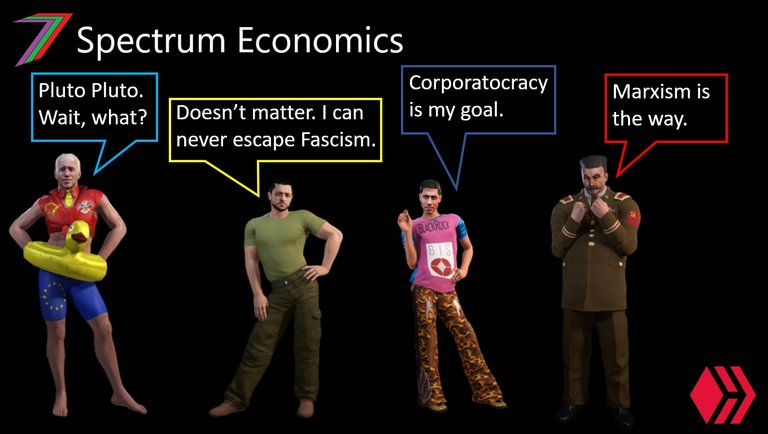
In my post, Exploring the Political Spectrum (Octagon Model), I describe a multifaceted political spectrum. Instead of the single axis of left to right. With this spectrum, I considered three axes. They are globalism to nationalism, collectivism to individualism, and freedom to order. I presented them in the form of an octagon. It was easier than using a three dimensional model, which is difficult to visualise using two-dimensional media.
In a more recent post, If We Want to Change the World, We Need to Work Together, I briefly reintroduced the political spectrum octagon model. It was to demonstrate the flaws in current political systems and our way of thinking. However, I did not elaborate on how the model could be applied to represent different political ideologies.
In this post, I assign political ideologies to the points and sides of the octagon. This is to provide some idea of the relationship and closeness of various ideologies. It should enable people to place themselves and their beliefs within the spectrum.
The Octagon Political Spectrum
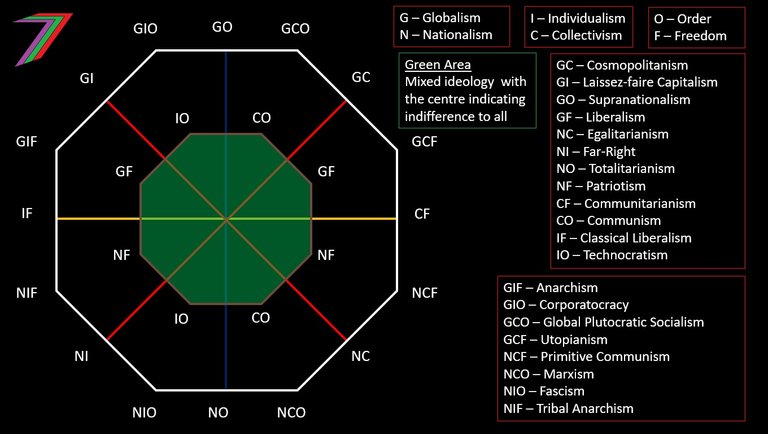
Disclaimer: There is no complete consensus regarding some systems and theories. For this post, I have used definitions and descriptions that closest match my interpretations of these systems and theories. The purpose of these definitions is not for absolute agreement but for comparison within one model.
Definitions
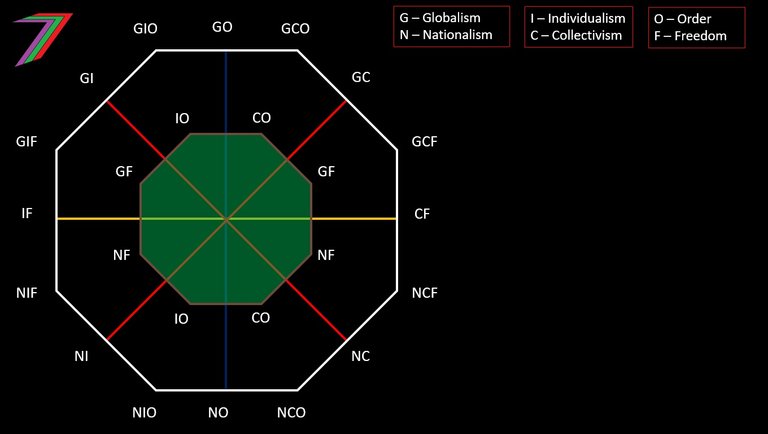
Before I elaborate on the model, I would like to define the six terms used to create the axes.
Globalism to Nationalism
Globalism:
The attitude or policy of placing the interests of the entire world above those of individual nations. (dictionary.com).
Nationalism:
Devotion and loyalty to one's own country (dictionary.com).
Collectivism to Individualism
Collectivism:
The political principle of centralized social and economic control, especially of all means of production (dictionary.com).
Individualism:
A social theory advocating the liberty, rights, or independent action of the individual (dictionary.com).
Freedom to Order
Freedom:
Exemption from external control, interference, regulation, etc (dictionary.com).
Order:
Conformity or obedience to law or established authority; absence of disturbance, riot, revolt, unruliness, etc (dictionary.com).
These terms are opposites. Therefore, the axes form a spectrum for different political ideologies.
The Green Area
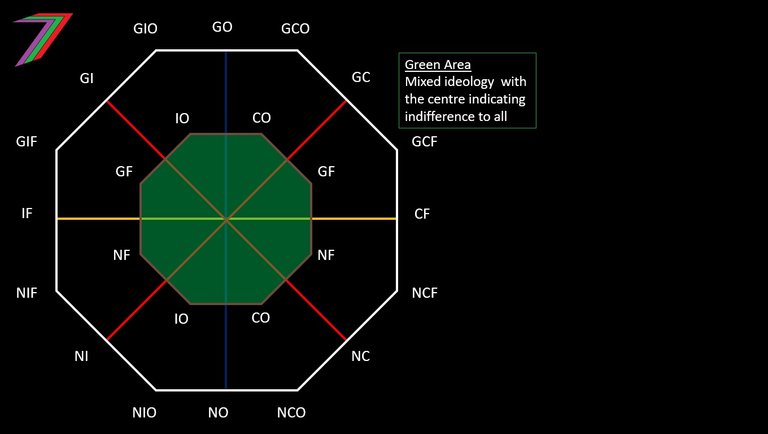
The green area represents political ideology that does not lean particularly strongly in any of the six directions indicated by the axes. The centre represents almost complete indifference to all. This is contrary to the black area, which indicates a strong leaning to at least one of the six directions indicated by the axes.
Two Extremes
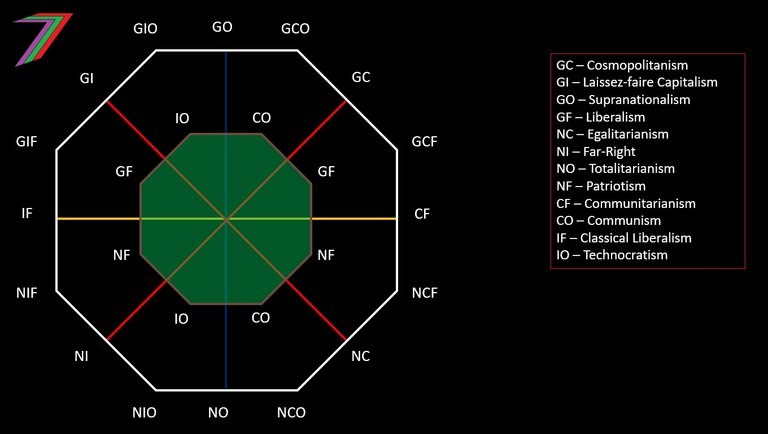
Based on the model, a political ideology can be presented based on where it fits on three axes. In this section, I have listed examples of political ideology that, I believe, based on the definitions I have found, align closely with the ends of two of the stated axes. For example, it strongly favours collectivism over individualism, nationalism over globalism, and is not definitive in regards to freedom and order.
Some of these ideologies focus on the social, and others on the economic aspects. An axis has not been included for this comparison as it is mostly covered within the existing axes. For example, most combinations with collectivism focus on the social aspects, while those with individualism focus on the economic aspects.
Cosmopolitanism (Globalism and Collectivism)
Both prescriptive and aspirational, believing humans can and should be ‘world citizens’ in a ‘universal community’. The idea encompasses different dimensions and avenues of community, such as promoting universal moral standards, establishing global political structures, or developing a platform for mutual cultural expression and tolerance (Wikipedia).
Comment: ‘World citizens’ strongly indicates support for the social aspects of globalism. Community and multiculturalism indicate support for the collective over the individual.
Laissez-faire Capitalism (Globalism and Individualism)
The theory or system of government that upholds the autonomous character of the economic order, believing that government should intervene as little as possible in the direction of economic affairs (dictionary.com).
Comment: The absence of interference in the economy strongly enables international trade, economic globalism. There is an absence of government involvement in the redistribution of wealth or the operation of businesses.
Supranationalism (Globalism and Order)
Outside or beyond the authority of one national government, as a project or policy that is planned and controlled by a group of nations (dictionary.com).
Comment: This is order, which is enforced by global bodies such as the United Nations.
Liberalism (Globalism and Freedom)
The political belief that there should be free trade, that people should be allowed more personal freedom, and that changes in society should be made gradually (Cambridge Dictionary).
Comment: Free trade indicates economic globalism, and personal freedom is in the context of economic freedom. This definition implies support for individualism, but other definitions support collectivism in some social settings.
Egalitarianism (Nationalism and Collectivism)
Is a school of thought within political philosophy that builds on the concept of social equality, prioritizing it for all people. Egalitarian doctrines are generally characterized by the idea that all humans are equal in fundamental worth or moral status. As such, all citizens of a state should be accorded equal rights and treatment under the law (Wikipedia).
Comment: The equality aspects of egalitarianism support collectivism. The focus on its own citizens suggests a national rather than a global focus. I doubt that many who support this ideology have a strong commitment to nationalism. Therefore, my placement of Egalitarianism at the edge of the octagon is not exactly ideal. This could be updated if there is a more fitting ideology.
Far-Right (Nationalism and Collectivism)
The complex of individuals or organized groups holding the most conservative views in politics and social policy, opposed to political and social reform and often emphasizing nationalism and deregulation (dictionary.com).
Comment: It very strongly supports nationalism. Its emphasis on deregulation implies support for individualism.
Totalitarianism (Nationalism and Order)
Absolute control by the state or a governing branch of a highly centralized institution (dictionary.com).
Comment: Absolute state control indicates both nationalism and order.
Patriotism (Nationalism and Freedom)
Devoted love, support, and defense of one's country; national loyalty (dictionary.com).
Comment: Love for one’s country aligns with nationalism. The willingness to defend against external threats further indicates nationalism as well as a desire for freedom from control.
Communitarianism (Collectivism and Freedom)
Is the idea that human identities are largely shaped by different kinds of constitutive communities (or social relations) and that this conception of human nature should inform our moral and political judgements as well as policies and institutions (Stanford Encyclopaedia of Philosophy).
Comment: Community focus aligns with collectivism. People support each other freely, rather than through force.
Communism (Collectivism and Order)
A theory or system of social organization based on the holding of all property in common, actual ownership being ascribed to the community as a whole or to the state (dictionary.com).
Comment: Advocates forced collectivism by authority.
Classical Liberalism (Individualism and Freedom)
An early form of liberalism, the political-philosophical doctrine which holds that the central problem of politics is the protection of individual freedom or liberty (Britannica).
Comment: It is focused on individual freedom and liberty.
Technocratism (Individualism and Order)
A theory and movement, prominent about 1932, advocating control of industrial resources, reform of financial institutions, and reorganization of the social system, based on the findings of technologists and engineers (dictionary.com).
Comment: Control of resources and institutions through experts rather than communities or the state demonstrates order and implies individualism.
Three Extremes (Corners of the Octagon)
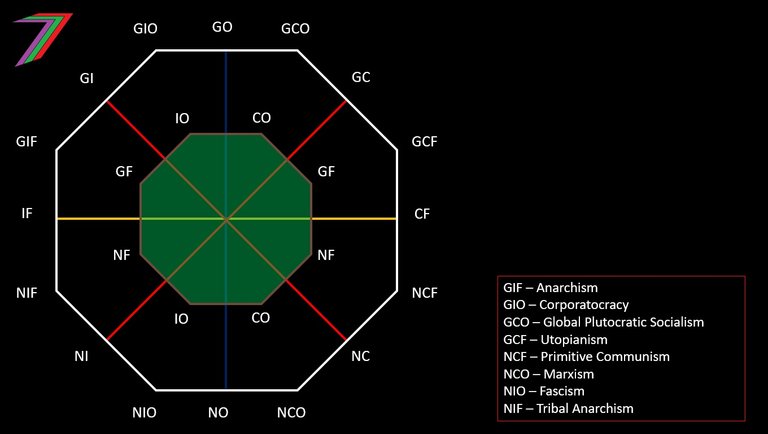
In this section, I have listed examples of political ideology that I believe, based on the definitions I have found, align closely with the eight points of the octagon. I would argue that these ideologies could be placed closest to the ends of all three axes.
Anarchism (Globalism, Individualism, and Freedom)
The political belief that there should be little or no formal or official organization to society but that people should work freely together (Cambridge Dictionary).
Comment: Anarchy is quite broad. Some might argue that it is more collectivist in nature. However, people are free to make their own decisions as individuals. Collectivism would only occur through choice. There is no method of ensuring this would happen.
Corporatocracy (Globalism, Individualism, and Order)
It is an economic, political and judicial system controlled by business corporations or corporate interests (Wikipedia).
Comment: Corporations with the most power operate internationally. Hence, support globalism. The biggest corporations control production and strongly influence the media. In turn, influences, if not dictates, political opinion. Hence, they control the population. Despite influencing politics, the biggest corporations are most focused on their own economic success. Hence, they support individualism. Blackrock’s and Vanguard’s influence on economics and politics could be considered a form of corporatocracy.
Global Plutocratic Socialism (Globalism, Collectivism, and Order)
It is a global economic and political system controlled by the wealthiest elite, which is designed to destroy the middle class and create equality among the working class (The American Conservative).
Note: Summary of Discussion
Comment: This is a new extreme form of political ideology. The world’s richest people operate internationally. They work through think tanks such as Chatham House and Rand Corporation and global organisations such as the World Economic Forum (WEF) and the World Health Organisation (WHO).
The wealthy directly and indirectly control governments. They directly control them through funding political parties and sometimes by blackmailing politicians. They indirectly control them through the media and social media. The wealthy continue accumulating wealth through government programs, projects, and procurement. The government pays them through high taxes or the printing of more money.
The accumulation of wealth by the richest comes from the middle class. This essentially leads to most of the middle class becoming working class. Through propaganda (woke ideology), this is betrayed as good, as inequality is reduced among the non-elite.
We could argue that Global Plutocratic Socialism is an evolved, more civilised form of Fascism where the state has been replaced with a global order and the sole dictator has been replaced by a handful of elites. They aim to conquer the world through high-level consensus instead of military conquest.
Utopianism (Globalism, Collectivism, and Freedom)
The belief that everything can be perfect, often in a way that does not seem to be realistic or practical (Oxford Learner’s Dictionaries).
Comment: This is an ideal world where everyone is free and happy. It is collectivist by nature, as people voluntarily work for the betterment of all. This is essentially an ideal form of anarchism. However, different historical political thinkers have proposed alternative ways of achieving utopianism.
Primitive Communism (Nationalism, Collectivism and Freedom)
Is a collective right to basic resources in a social relationship like society or family without any authoritarian rule (World Atlas).
Comment: This is the proposed existence of communism in small tribes. It is voluntary because the people in the tribe or community are familiar with each other and trust each other. This structure breaks down as communities grow and trust becomes difficult to maintain across a larger group.
Marxism (Nationalism, Collectivism and Order)
Is an authoritarian form of communism where the state has absolute control (ThoughCo).
Note: Summary of Discussion
Comment: It is essentially communism in regards to collectivism and order. Based on the Communist Manifesto, there is a very strong emphasis on state control. Therefore, we should conclude that it also strongly supports nationalism.
Fascism (Nationalism, Individualism and Order)
A governmental system led by a dictator having complete power, forcibly suppressing opposition and criticism, regimenting all industry, commerce, etc., and emphasizing aggressive nationalism and often racism (dictionary.com).
Comment: Fascism is often portrayed as the opposite of Marxism. This is not the case. Like Marxism, it strongly supports both nationalism and order. However, Fascism does not support collectivism, equality, or total state ownership. It supports segregation based on class, race, and sex. It supports high taxation to fund its own objectives. Private businesses produce output to meet the needs of the state (i.e., the dictator of the state). Fascism is more focused on military aggression to meet objectives.
Tribal Anarchism (Nationalism, Individualism and Freedom)
Is a radical anti-state ideology which emphasizes freedom of association (Word Press Article).
Comment: A form of anarchism where people form their own tribes or communities. It is a form of nationalism as people form loyalties to particular groups, which can become exclusive. It has been criticised for being racist. However, this is not the perception of those who support this ideology.
Exploring your own political views and those of relevant parties
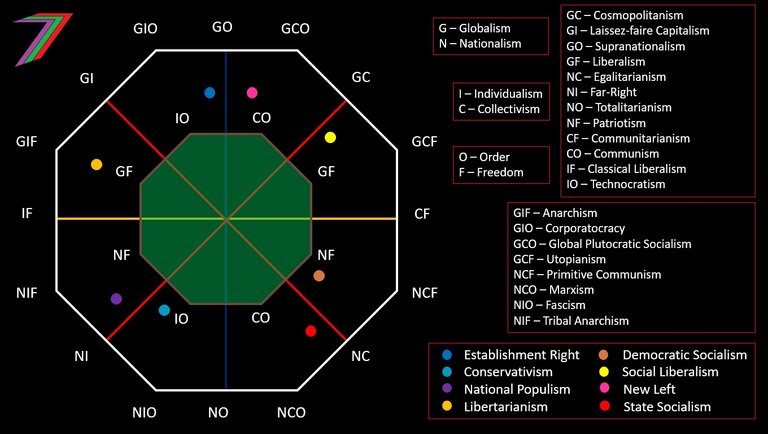
The octagon model can be used to self-assess personal beliefs as well as how well they align with the positions of political parties and candidates.
To demonstrate how the model could be used, I have selected eight political ideologies.
Establishment Right
The so-called right of politics strongly lean towards globalism and order. They also have a slight leaning towards economic individualism and social collectivism. They prioritise economic growth over social welfare. Hence, I placed them in the GIO segment near the GCO segment. The Establishment Right is moving in the direction of Supranationalism.
Democratic Socialism
I believe the core leanings of Democratic Socialism are close to the opposite of the Establishment Right. They lean towards nationalism to protect wages and social services for citizens, and prices for businesses. They lean slightly more towards freedom than order by supporting decentralised decision-making and democratic practices.
Conservatism
Conservatism is often associated with right-wing ideology. I would argue that there is partial alignment. The focus is on preserving tradition. The extent of conservatism varies greatly between countries. This implies nationalism to preserve culture. Individualism to preserve any existing class system. Order to enforce protection of these values. In most western countries, conservatism is only a slight leaning in these directions. In Middle Eastern countries, the leaning is much stronger. This could be to the extent that they more closely resemble Feudalism.
Social Liberalism
Social Liberalism is close to the opposite of conservatism. Instead of clinging to tradition, it strives for new knowledge and ways of doing things. This leads to greater freedom and a wider acceptance of ideas and people. The social aspect encourages the pursuit of goals that will enable equal opportunities. It has a much stronger leaning towards collectivism than traditional or classical liberalism. This ultimately leads to the sacrifice of some freedom.
New Left
What I refer to as the ‘New Left’ is an ideology based on socialism that has transitioned towards globalism. If the combination of globalist and collectivist ideologies encourages the mass immigration of poor people from other countries, the standard of living of the existing residents is threatened. Therefore, willingness for voluntary collectivism will fall. This globalist, collectivist ideology would only be able to be sustained through its enforcement. This would greatly erode freedoms. The mass inflow of poorer migrants would prevent wage increases while lowering the costs of the businesses that employ them. This would lead to the transfer of wealth from the middle class to the wealthiest business owners. The ‘New Left’ is a movement towards Global Plutocratic Socialism with some elements Corporatocracy and Supranationalism.
National Populism
The ‘New Left’ ideology is both radical and popular. This has led to staunch opposition to it. National Populism has provided that opposition. It is a strong nationalist movement that largely blames the globalism aspect of the ‘New Left’ for the decline of the middle class. Supporters of the ‘New Left’ have responded by labelling the supporters of National Populism as racists for their support of nationalism. This has led to increased calls for censorship of speech supporting this ideology. However, this has strengthened the support for National Populism as they claim the ‘New Left’ is attacking freedom of speech. This claim for support of freedom is a little hypocritical, as National Populism leaders can be authoritarian.
Libertarianism
Libertarian opinions are typically very diverse. This is because the ideology supports both individualism and freedom. For example, it is possible that a person could exercise their individualism to support voluntary collectivism. Libertarians support for freedom implies they also support globalism (e.g., non-intervention). This would include free trade and free movement of people. It is also possible that a libertarian’s values could closely align with their national culture, but at the same time, they do not impose their own values on other people, even if these values are to the complete contrary of their own. Since libertarians have such a wide diversity of opinions and because of their strong leanings towards anarchism, their presence in politics is almost non-existent.
State Socialism
State Socialism supports state ownership of the means of production. It is generally authoritarian in nature. Typically, State Socialism supports protectionism. This is to restrict competition and protect local wages. State Socialism has enjoyed periods of popularity, but has typically led to underperforming economies and poverty. Some might argue that China is an exception. The Chinese Government maintains state ownership over most production and is authoritarian. However, China has embraced international trade and has greatly benefited from capitalism. They have what they term a ‘Socialist Market Economy’.
Actual Political Parties
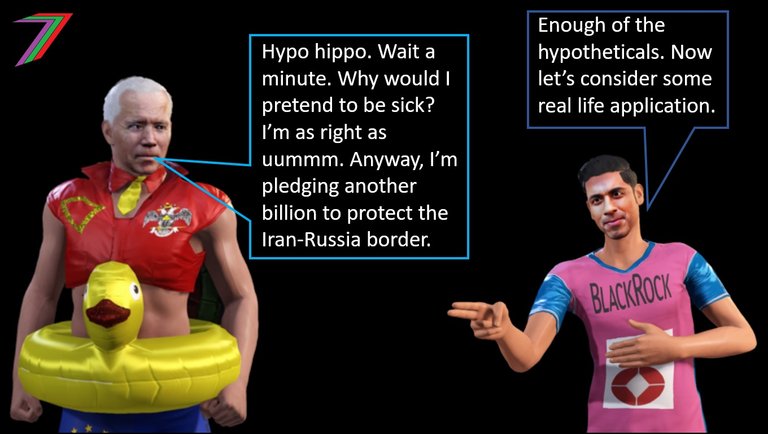
Most western countries are dominated by two political ideologies (i.e., right vs. left). This ideology is often split between two dominant parties. The dominant ideology for the right is what I have termed the Establishment Right. The dominant ideology for the left is what I have termed the New Left. The differences between these two ideologies are minimal. The key difference between the two is the extent of collectivism that is enforced upon the public.
In a two party system, there is greater divergence within parties than there is between the parties. In some countries, National Populism is partially replacing the Establishment Right as it challenges the New Left and more closely aligns with Conservatism, which is traditionally aligned with the right ideology. The New Left faces less opposition from within, but is not completely unchallenged. Some left-wing politicians such as Bernie Sanders, who is more aligned with Democratic Socialism, challenge their party’s approach to globalism. The most legitimate internal struggle the New Left faces is the inconsistencies with the woke aspects of their ideology. Hence, we see leaders, such as Keir Starmer (UK Labour Party Leader), constantly changing their positions to align with the current prevailing aspects of this perverse ideology.
Conclusion
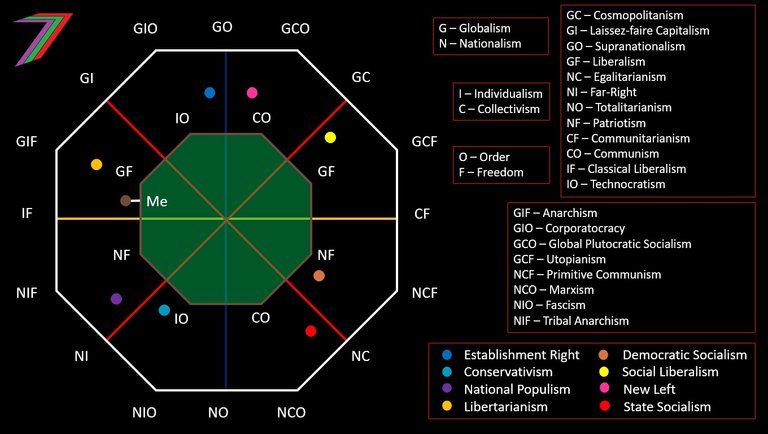
I have covered a wide variety of political ideologies. Not all of them fit exactly where I have placed them. I would argue some are a little more nuanced than just aligning with two or three of the extremes described. There is also plenty of divergence of thought around most of these ideologies. Therefore, I would expect most people to place them a little differently or even replace a few. Precision is not particularly important, as the model can be easily relabelled. The key purposes of the octagon model are to:
- enable us to make comparisons based on different characteristics of ideologies
- compare different political parties and candidates
- see how our views and opinions compare with these ideologies, political parties and candidates
- gauge whether political parties and politicians act consistently with the ideology they claim to follow.
I believe it serves these purposes quite well. We can also see which ideologies are not represented. I recommend that you take the time to explore your own political views using this model as a guide.
More posts

I have several collections of posts. I have organised these collections based on content and purpose.
The first collection contains six collection posts created before PeakD had the collection feature. Four of these posts relate to the core of my content; one of them contains all my Actifit Posts, and one of them contains my video course, ‘Economics is Everyone’.
The second collection consists of the posts that I consider define my channel. These posts are significant in terms of content as well as how they contribute to the growth of the channel. These posts reveal the most about what I believe in.
The third and fourth collections are what I call my ‘Freedom-based Economics Living Book’. They contain all the posts that support my ideas about the value and power of freedom. Some of these posts explain what we can achieve with freedom and what we need to utilise it for. Some of them explain how we are deprived of freedom and how we often give up freedom for security and comfort. The third collection concludes with possible scenarios depending on what we (society) choose to do.
Hive: Future of Social Media
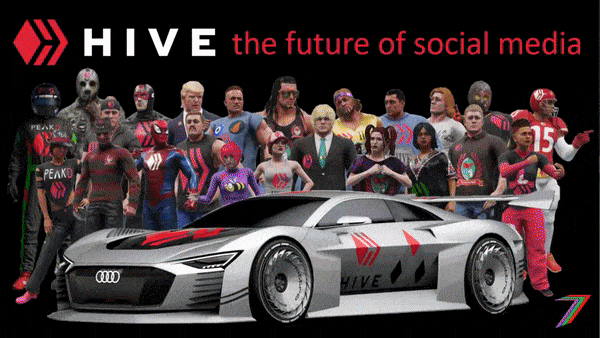
Spectrumecons on the Hive blockchain
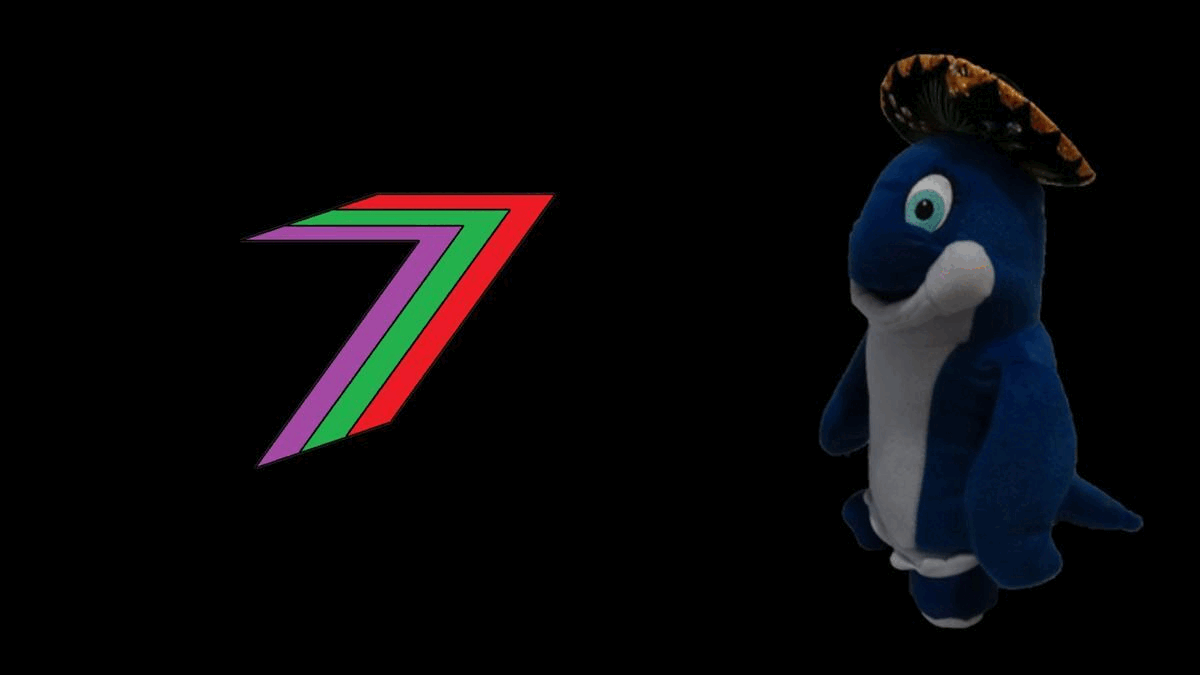




This post has been manually curated by @steemflow from Indiaunited community. Join us on our Discord Server.
Do you know that you can earn a passive income by delegating to @indiaunited. We share more than 100 % of the curation rewards with the delegators in the form of IUC tokens. HP delegators and IUC token holders also get upto 20% additional vote weight.
Here are some handy links for delegations: 100HP, 250HP, 500HP, 1000HP.
100% of the rewards from this comment goes to the curator for their manual curation efforts. Please encourage the curator @steemflow by upvoting this comment and support the community by voting the posts made by @indiaunited.
Wow, I found this post quite interesting. I'm not an economics person, but I guess I can learn a lot of that from you. I followed you to receive more of this good stuff. Thanks man for this awesome content on the Blockchain.
Much love ♥️
Thanks for following my content. Most of my content relates to economics. This one is more about political ideologies, which can greatly impact economies.
It's my pleasure Sir ♥️
This is interesting. There are a lot more political ideologies that I wasn't aware of. I am familiar with the US two party system, but the one in the Philippines seems to be a mix of a lot of different things. We do have a kind of party system, but their platforms and ideologies differ per candidate, and the party doesn't really have anything concrete.
It's good that different candidates have different opinions. It gives the voters more choice. They have a better chance of electing someone who represents their own opinions. In the West, politicians are forced to push party ideology. If there are just two parties, then we have only two dominant ideologies. What makes it worse is that the ideologies of the two main parties are similar. The politicians that do not push the party line are suppressed.
Yeah, I noticed that too. My sisters are in the US, so I tend to get interested by their politics from time to time. It is interesting how the party suppresses their candidate's ideologies when they stray a bit far from what they want.
I'm NIF. Patriotism and Classic Liberalism.
Not sure how these founding principles of Western Civilisation become "Tribal Anarchism (Nationalism, Individualism and Freedom)".
That's a pretty good combination.
The ideologies at the points are intended to be the most extreme. Anything between the extremes is a little more constructive. A person can be patriotic and respectful of other cultures. A person can believe that laws can be used to protect freedom.
I learn something new from it.
Awesome
To an extent I believe globalism I'd turning our world to a direction it should not be. Civilisation becomes the order of the day but get abused
That's an interesting and different perspective.
Nice abstract to begin the study of ideologies. It clarifies some ideas 🙌
Glad you found it useful.